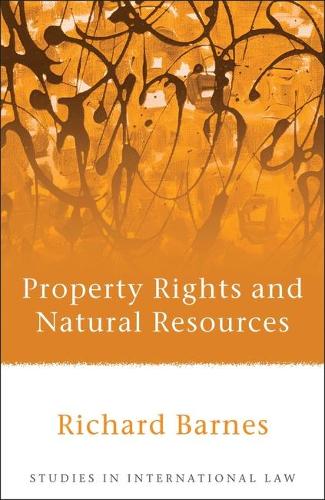
Property Rights and Natural Resources
(Hardback)
Publishing Details
Property Rights and Natural Resources
By (Author) Richard Barnes
Bloomsbury Publishing PLC
Hart Publishing
22nd April 2009
United Kingdom
Classifications
Professional and Scholarly
Non Fiction
346.044
Winner of Society of Legal Scholars Prize for Outstanding Legal Scholarship 2009 (UK)
Physical Properties
Hardback
472
Width 156mm, Height 234mm, Spine 37mm
850g
Description
Winner of the SLS Peter Birks Prize for Outstanding Legal Scholarship 2009. The use of private property rights to regulate natural resources is a controversial topic because it touches upon two critical issues: the allocation of wealth in society and the conservation and management of limited resources. This book explores the extension of private property rights and market mechanisms to natural resources in international areas from a legal perspective. It uses marine fisheries to illustrate the issues that can arise in the design of regulatory regimes for natural resources. If property rights are used to regulate natural resources then it is essential that we understand how the law and values embedded within legal systems shape the development and operation of property rights in practice. The author constructs a version of property that articulates both the private and public function of property. This restores some much needed balance to property discourse. He also assesses the impact of international law on the use of property rights-a much neglected topic-and shows how different legal and socio-political values that inhere in different legal regimes fundamentally shape the construction of property rights. Despite the many claimed benefits to be had from the use of private property rights-based management systems, the author warns against an uncritical acceptance of this approach and, in particular, questions whether private property rights are the most suitable and effective arrangement of regulating of natural resources. He suggests that much more complex forms of holding, such as stewardship, may be required to meet physical, legal and moral imperatives associated with natural resources.
Reviews
...Richard Barnes has written the most extensive and detailed book to date on sovereignty and property rights in marine resources under international law...Barnes has done a masterful job of combining theory and history to explain how international law has gradually expanded sovereignty and property rights to one of the two great global commonses: the oceans (the other is the global climate). As such, it makes a great contribution to the larger cross-disciplinary literature on the emergence of property rights in natural resources. It should be read by every legal scholar, economist, and political scientist interested in common pool resource problems. Daniel H. Cole Law and Politics Book Review Vol.19, No.11, November 9, 2009 This is a very worthwhile work - it is authoritative, comprehensive, well-structured and eminently readable...an excellent work of study and reference for both law students and legal practitioners. It is enlightening and enjoyable to read. Robert Pritchard ResourcesLaw International July 2009 This is an impressive piece of scholarship. It should be read by academics and students interested in property law and by those interested in fisheries law. This is an important book which deserves to be widely read ... a significant contribution to the available literature. Nigel Bankes Journal of Energy and Natural Resources Law Volume 27, No 4, 2009 This is a fascinating and engaging book that takes the reader on a journey into the intricate workings of property rights - the journey is never dull... it is a valuable addition to the available literature in teh area of natural resource management. Jona Razzaque Journal of Environmental Law May 2010 In this fascinating book, Richard Barnes constructs a version of property rights which articulates both the public and private functions of property in the context of the international legal system. This is a skilfully crafted foray into a under-researched area. Using fisheries as a motif, Barnes has provided a tremendously valuable roadmap through public, private, domestic and international law. Would that the expertise, insight and creativity demonstrated by Barnes in this book be applied to the protection of other endangered species. Catherine MacKenzie The Cambridge Law Journal Volume 70, Part 1
Author Bio
Richard Barnes is Senior Lecturer in Law at the University of Hull.
